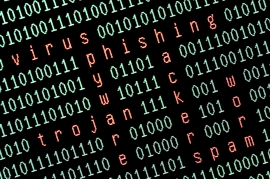|
|
 |
Where Does "Malicious Code" Come From and How Can You Avoid It?It's an experience that is all too common in today's information technology environment. Your computer is working fine, then, from one minute to the next, it begins to act as if it's possessed. It may begin to run very slowly. Some software programs may begin to run erratically or not run at all. Your e-mail quits working. You can't access the internet. You try re-starting your computer, and it seems to work for a while, then the weird symptoms return, or others take their place. Actually, in a sense, your computer really is possessed, by what is referred to as malicious code. It's also called, among the other things, a virus, malware, and spyware, but whatever it's called, it's a big problem. Malicious code is a miniature software program that is designed to cause your computer to do things you may not want it to do. Malicious code is created by individuals who are often very talented programmers, but who have decided to use their talent for ill rather than good. Malicious code can find its way into your computer in a variety of ways. It may come disguised as an innocent, friendly-sounding e-mail message you're invited to open. It may be picked up when you visit a website and view certain pictures or videos, or by downloading a file. It's been estimated that one in ten Web pages may contain malware. Your first line of defense should be common sense. For example, never open an e-mail message from a source you're unfamiliar with. Be very cautious about downloading anything from a website you're unfamiliar with. To help protect your computer from malicious code that might be picked up from a Web site, you should install anti-virus software. There are a number of programs available, but care should be exercised when choosing the best one for your computer. Some are more effective than others, and there can be compatibility issues that may cause your computer to run much more slowly after the program is installed. It's also important to bear in mind that the quantity and variety of malicious code has increased greatly, and probably will continue to do so. New types of malicious are continually being developed, and as a consequence, there is no anti-virus program that is foolproof. Ultimately, despite your best efforts, your computer may become infected with malicious code. If you suspect that has happened, take immediate steps to eliminate the infection. The longer you wait, the worse the symptoms may become. In the worst cases, data loss can occur. Contact a professional who has the experience and the resources to deal with the problem. He should be able to diagnose and cure the infection in a matter of a few hours, give you a firm estimate of the cost before he begins, and have you up and running again with minimal inconvenience.
• Learn more about CompuPane's other computer services. |

